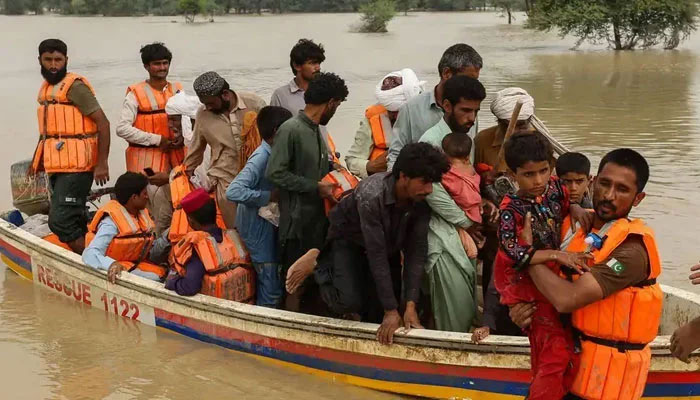Climate change to claim 15.6m lives by 2050, warn experts
Study, published in Journal of Surgical Specialties and Rural Practice
Islamabad: Up to 15.6 million people in low- and middle-income countries (LMICs) are projected to die between 2026 and 2050 due to climate-sensitive diseases, experts have warned in a groundbreaking international paper that explores the devastating intersection of climate change, rapid urbanization, and rural health inequalities.
Despite contributing minimally to global carbon emissions, rural populations in LMICs are bearing the brunt of this escalating crisis.
The study, published in the Journal of Surgical Specialties and Rural Practice, presents a comprehensive analysis of how extreme weather events, shifting disease patterns, and inadequate health infrastructure are amplifying health disparities across rural regions already weakened by poverty, weak governance, and decades of systemic neglect.
“Climate change is not just an environmental issue—it’s a public health emergency that is hitting the rural poor the hardest,” the paper warns, adding that climate-induced stress is driving food insecurity, mental health issues, and the spread of communicable diseases like malaria, dengue, and diarrhea in rural LMICs. One of the most alarming projections is the estimated annual toll of 250,000 additional climate-related deaths in LMICs, according to the World Health Organization. These deaths are attributed to shifting patterns of infectious diseases, malnutrition, and extreme weather, disproportionately affecting women, children, and the elderly in rural areas.
Dr. Sankha Randenikumara, lead author from Sri Lanka, and co-authors from Pakistan, India, South Africa, Ukraine, and 10 other countries, argue that the ongoing migration of healthcare professionals from rural to urban areas is hollowing out already fragile rural health systems.
This migration is leading to dependence on traditional medicine and increasing health risks for rural communities, particularly where agriculture is the primary source of livelihood and is itself under siege from climate shocks. The study singles out rapid, unregulated urbanization as another compounding threat. It notes that rural-to-urban migration is creating overcrowded informal settlements in cities that lack clean water, sanitation, and healthcare. These urban slums, the authors say, are becoming breeding grounds for infectious diseases and social exclusion, placing further stress on both rural and urban health systems.
In a rare interdisciplinary call to action, the authors propose targeted policy reforms to integrate climate adaptation with health planning. These include strengthening climate-resilient health infrastructure, scaling up telemedicine and mobile health platforms, adopting climate-smart agricultural practices, and empowering community health workers. Notably, the study highlights Pakistan’s own success with mobile health platforms that provided maternal and child health services during the COVID-19 crisis. Similar models from India, Tanzania, and Australia are cited as evidence that community-based healthcare models—when properly resourced—can improve access and resilience in underserved rural areas.
Prof. Dr. Ejaz Ahmad Khan of the Health Services Academy, Islamabad, who co-authored the paper, emphasized the urgency of aligning health policies with climate resilience strategies. “We need to invest now in rural health systems before the gap becomes irreparable. Climate change is a multiplier of existing inequalities,” he said.
Importantly, the paper also highlights the unique role of family doctors, calling them “agents of change” who can engage with individuals, communities, and policymakers to address the climate-health crisis. From “greening” general practice clinics to delivering climate education during consultations, family physicians are urged to take a leading role in the response. The authors lament a serious gap in research on climate and health in rural settings. They recommend future studies on gendered health impacts, mental health effects of climate trauma, and the effectiveness of early warning systems tailored to rural environments. They also call for increased funding, legal protections, and integrated governance across sectors such as health, environment, agriculture, and urban planning.
With the clock ticking and vulnerable populations increasingly at risk, the report ends with a sobering reminder: unless bold, coordinated, and inclusive actions are taken immediately, climate change will deepen the fault lines of inequality, placing millions of lives in jeopardy.
-
 Columbia University Sacks Staff Over Epstein Partner's ‘backdoor’ Admission
Columbia University Sacks Staff Over Epstein Partner's ‘backdoor’ Admission -
 Ozzy Osbourne's Family Struggles Behind Closed Doors
Ozzy Osbourne's Family Struggles Behind Closed Doors -
 Dua Lipa Claims Long-distance Relationship 'never Stops Being Hard'
Dua Lipa Claims Long-distance Relationship 'never Stops Being Hard' -
 BTS Moments Of Taylor Swift's 'Opalite' Music Video Unvieled: See Photos
BTS Moments Of Taylor Swift's 'Opalite' Music Video Unvieled: See Photos -
 Robin Windsor's Death: Kate Beckinsale Says It Was Preventable Tragedy
Robin Windsor's Death: Kate Beckinsale Says It Was Preventable Tragedy -
 Rachel Zoe Shares Update On Her Divorce From Rodger Berman
Rachel Zoe Shares Update On Her Divorce From Rodger Berman -
 Kim Kardashian Officially Takes Major Step In Romance With New Boyfriend Lewis Hamilton
Kim Kardashian Officially Takes Major Step In Romance With New Boyfriend Lewis Hamilton -
 YouTube Tests Limiting ‘All’ Notifications For Inactive Channel Subscribers
YouTube Tests Limiting ‘All’ Notifications For Inactive Channel Subscribers -
 'Isolated And Humiliated' Andrew Sparks New Fears At Palace
'Isolated And Humiliated' Andrew Sparks New Fears At Palace -
 Google Tests Refreshed Live Updates UI Ahead Of Android 17
Google Tests Refreshed Live Updates UI Ahead Of Android 17 -
 Ohio Daycare Worker 'stole $150k In Payroll Scam', Nearly Bankrupting Nursery
Ohio Daycare Worker 'stole $150k In Payroll Scam', Nearly Bankrupting Nursery -
 Michelle Yeoh Gets Honest About 'struggle' Of Asian Representation In Hollywood
Michelle Yeoh Gets Honest About 'struggle' Of Asian Representation In Hollywood -
 Slovak Fugitive Caught At Milano-Cortina Olympics To Watch Hockey
Slovak Fugitive Caught At Milano-Cortina Olympics To Watch Hockey -
 King Charles Receives Exciting News About Reunion With Archie, Lilibet
King Charles Receives Exciting News About Reunion With Archie, Lilibet -
 Nvidia Expands AI Infrastructure With Nevada Data Centre Lease
Nvidia Expands AI Infrastructure With Nevada Data Centre Lease -
 Royal Family Shares Princess Anne's Photos From Winter Olympics 2026
Royal Family Shares Princess Anne's Photos From Winter Olympics 2026




